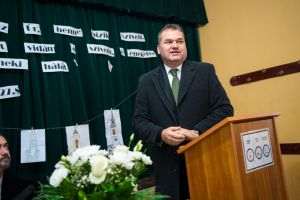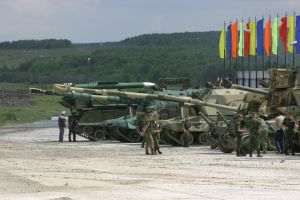The beginning of the new school year is creating troubles for every European government. The sanitary crisis is far from being over and there is the justifiable concern that schools can turn into true coronavirus hotspots. The more resolute Balkanic governments, have already decided - either that school will be conducted exclusively online, or postponing the classes until October 1st- others including the Romanian one, are working with several options and ... are waiting for time to pass and for the virus to go away. Locally, the tensions are rising. Teachers are threatening they won't show up at school if, starting on September 1st, they don't get the raise that has already been approved, students are imperatively asking for the approval of clear measures, so they can know what awaits them, parents are watching the situation with concern.
The Orban government, after long convulsions and debates, has set up some regulations concerning the activity in schools and universities, in the current context of the world sanitary crisis. The questions are very technical, but it is good to know, the future school year looks like it's going to be unusual.
The government issued an emergency ordinance on the creation of measures for preventing infection with SARS-CoV-2 in early education facilities and colleges, the Ministry of Education states. The act also amends and updates National Education Law no. 1/2011.
According to a press release, the new legislative measures seek to ensure the right to education and healthcare for the beneficiaries of the pre-university education, for students and for the staff in the national education system. So, in pre-university education, depending on the evolution of the epidemiological situation, the Board of Directors of the school can propose, following the consultation with the parent association, that the educational activities that involve the physical presence of ante-pre-schoolers, pre-schoolers and pupils to be conducted over the internet (in compliance with the measures set through a joint order of the Ministry of Healthcare and the Ministry of Education and Research).
The Communique states: "The next procedural step stipulates that the proposal of the school, approved by the County School Inspectorate / The School Inspectorate of Bucharest be submitted to the County Committee for Emergency Situations/ The Committee of Bucharest for Emergency Situations, to be approved through a decision. The County Committee for Emergency Situations/ The Committee of Bucharest for Emergency Situations for Emergency Situations also decides where the applicability period of the passed measures is concerned, as well as concerning other specific measures which need to be taken by the school, depending on the epidemiological situation. The County School Inspectorates/ the School Inspectorate of Bucharest will communicate weekly to the Ministry of Education and Research the measures decided by the County Committee for Emergency Situations/ the Committee of Bucharest for Emergency Situations. The resumption of didactic activities under medical safety conditions, suspended based on this procedure, is decided by the County Committee for Emergency Situations/ the Committee of Bucharest for Emergency Situations, with the approval of the County Public Health Department/ the Public Health Department of Bucharest and by informing the pre-college education institution, and respectively by the County School Inspector / School Inspectorate of the City of Bucharest", the press release states. "The education institutions will draw up their own procedures for the processing of personal data of the participants in the activities conducted through technology and the internet, based on the framework methodology drawn up by the Ministry of Education and Research and approved via Minister's order, in compliance with specific legislation in effect."
The normative act passed in the government meeting also establishes that if education institutions don't have enough room to comply with the safety regulations set by the competent authorities, the county school inspectorates/the School Inspectorate of Bucharest can ask the authorities of the local administration to make available to pre-college educational institutions other areas appropriate for educational activities. In the event of the limitation or suspension of didactic activities which require the physical presence of the main beneficiaries of the education system, following the decision of the competent authorities, the Ministry of Education and Research can modify, through a minister's order, the number of hours allocated to the study disciplines/modules for the preparation through the framework-plans, as well as the weight of the number of classes of teaching and evaluation in the approved school curriculum. In the event of the limitation or suspension of didactic activities which require the physical presence of the primary beneficiaries of the education system in the education institutions, the samples stipulated by the law, as part of the 1st stage of the eliminatory exam for tenure in education, may also be done using technologies and the internet.
In higher education, depending on the epidemiological situation and the specifics of each university, in the 2020 - 2021 university year, based on the university autonomy, with taking public responsibility and in compliance with the quality of the education process, the manner in which the didactic activity which involves the students' physical presence will take place will be decided by the Senate of the University (in compliance with the measures established through the joint order of the Ministry of Healthcare and of the Ministry of Education and Research and of the general and sectoral regulations of the EU concerning the minimum number of hours for each subject). Educational activities involve three levels: the students' physical presence in every didactic activity; the students' physical presence for certain educational activities, established via a decision of the University Senate; the suspension of the didactic activities which require the students' physical presence in higher learning institutions. According to the Ministry of Education and Research, the resumption of didactic activities, suspended according to the aforementioned procedure, under circumstances of maximum safety, is decided by the University Senate, after obtaining the approval of the County Public Health Department/ the Public Health Department of Bucharest, which certify the compliance with the epidemiological requirements.
In the event of limiting or suspending the didactic activities which require the students' physical presence, the activities required by the 2020 - 2021 university year, according to the law, the college dissertation exams or the post-university activities, the defense of the Ph. D dissertations, the defense of the tenure dissertations for the 2020 - 2021 university year may also be performed through the computer-assisted technology and over the internet, for the regular, part-time and distance learning courses. Didactic and research activities stipulated by the law, as well as the exams for the end of semester and those for the completion of the bachelor and master's degrees, the defense of the Ph. D. dissertations conducted over the internet in the university year 2020 - 2021, in the full-time, part-time and online types of education will also be recognized.
The norms, which are more or less clear, will be implemented and interpreted by each school individually, and some fear this could be the great threat.
• Students want a dialog with politicians
Elections are knocking on the door, so it is the time of big promises, including those concerning education. The National Alliance of Romanian Student Organizations (ANOSR) has invited the parties in the parliament to a debate with the students who attended the General Assembly of the Federation, which was scheduled on Saturday, August 29th, 2020, starting at 14:00, in the Summer Garden of the Students' House of Culture of Bucharest: "In the context of the COVID-19 pandemic, it is undisputed that education is and will continue to be affected. Perhaps that is why concrete and feasible solutions are needed, that can reduce the negative impact and which can maximize the results obtained by the main beneficiaries, students. Therefore, we think the establishment of a clear and accepted vision when it comes to education as a national priority, to essentially make the political class behave responsibly and to shape up a decision that is consistent when it comes to the future. Our plan is that, during the event, we initiate a constructive dialogue between the political parties, concerning the topics of interest for education and to debate a number of guidelines, which are fit to implicate the university communities and to gradually improve the students' quality of life, after the appointment of a new government".
Petrişor-Laurenţiu Ţucă, president of the National Alliance of the Student Organizations in Romania, expects a fruitful dialogue with the politicians: "In these times of uncertainty we need a responsible political class, that would grant the necessary importance to investing in the educational system, as this is the only chance for Romanian society to grow. Thus, given that the local and parliamentary elections are coming, and they will have a significant impact on everybody, we want a dialogue with the representatives of political parties where we are going to present our objectives, objectives which we want to be included in the parties' agenda." ANOSR militates for a high-standard education system, investments in education and optimal conditions for students.
• Education, an opportunity for electoral campaigning
The current situation represents a good opportunity for electoral campaign, and so the opposition of the current government are not letting it go to waste. The representatives of the PSD are saying that the rules imposed by the Ministry of Healthcare concerning the beginning of the school show that the government's only concern was to cover their backs: "Essentially, the PNL is telling everyone that they only have obligations: children, parents and teachers have to wear masks, to stay away from one another, to use disinfectants, and school principals need to ensure an epidemiological triage, more classrooms, bench separators, a different program from one class to the next. That is even as the PNL failed to even provide the promised masks to the disadvantaged persons!" According to the PSD: "The < < Educated Romania > > of the PNL is the one where children from disadvantaged families don't matter, therefore the hundreds of thousands of families that do not have money for protection masks do not have the right to send their children to school. (...) The < < Educated Romania > > of the PNL is the one where teachers' salaries are considered by prime-minister Orban "pub money'', and therefore teachers do not deserve the wage increase they are entitled to by law. The < < Educated Romania > > of the PNL is the country where pupils in local communities that don't have enough classrooms or the money to apply the rules set in the offices of Victoria Palace don't have the right to education. The < < Educated Romania > > of the PNL is Romania where students don't exist, and therefore, no rules for the beginning of the university year have been drafted". The electoral campaign for the local elections has not yet begun officially, but in September it will be fully underway.
• Law for online education
President Klaus Iohannis has passed the draft law submitted by PSD senator Ecaterina Andronescu, which states that pre-college and college classes can also be conducted online, during states of emergency or sieges. "If the state of emergency or state of siege is decreed, as per the Constitution, the activities conducted in pre-school and middle school education can also be conducted online, in order to ensure the exercising of the right to education stipulated in art. 32 of the Constitution. (2) For pre-university education, the Ministry of Education and Research draws up the Methodology for the online performance of the activities in educational institutions, under the best possible circumstances", the laws promulgated by the president states. Also, "higher education institutions draw up, based on university autonomy and while assuming public responsibility, their own methodology of the activities conducted in the university online, approved by the University Senate, which ensure the adequate conducting of the educational activities", according to the quoted source. The Senate passed the draft law on July 21, and it was sent to be promulgated on July 27. The legislative initiative was adopted by senators with 102 votes "in favor", 26 votes "against" and zero abstentions.





























































